_We may earn revenue from the products available on this page and participate in affiliate programs. Learn more ›
_
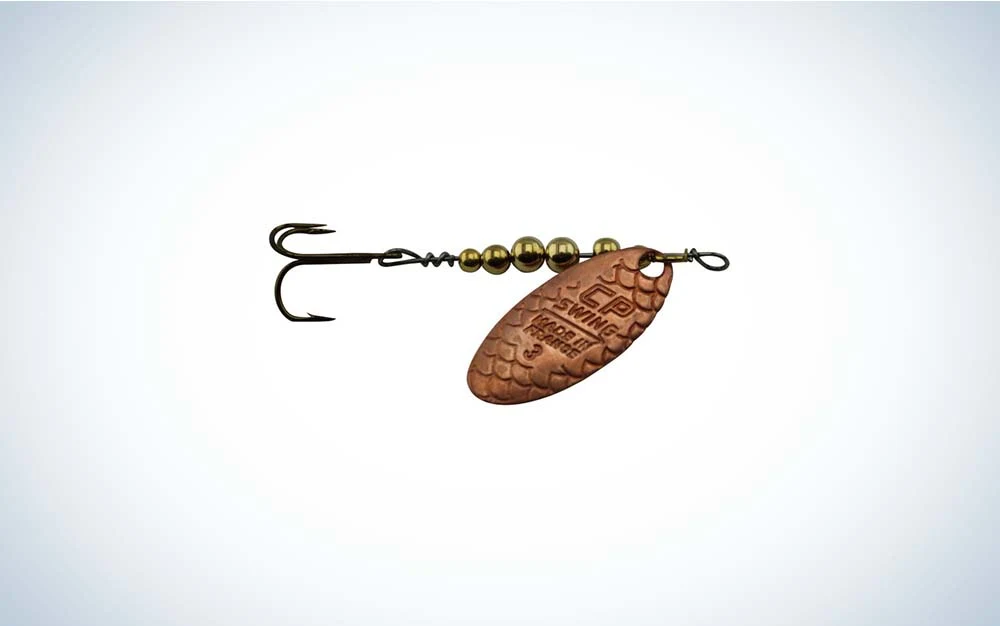
C.P. Swing Spinner
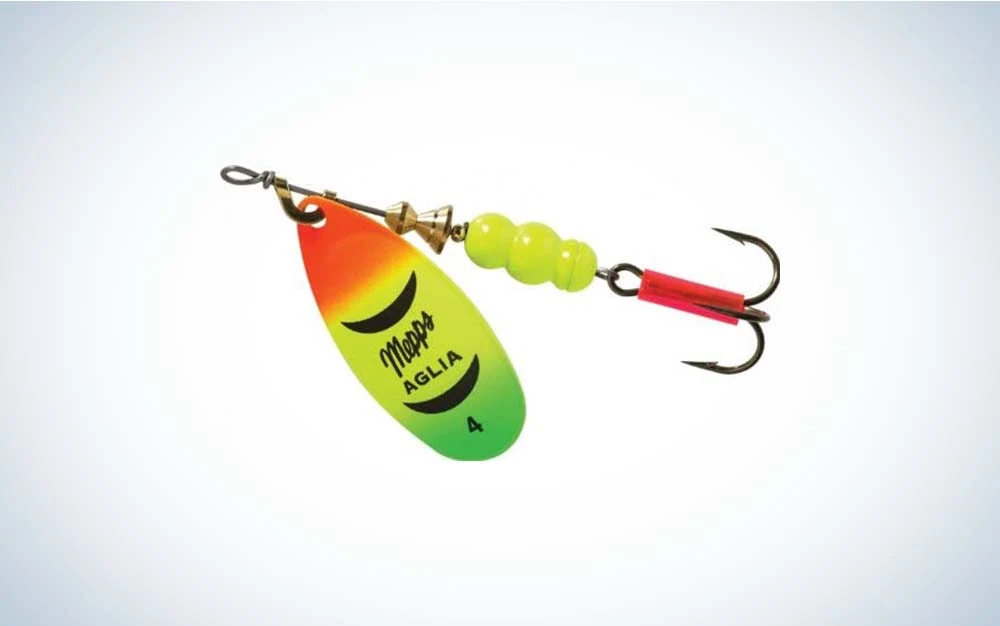
Mepp’s Aglia Spinner
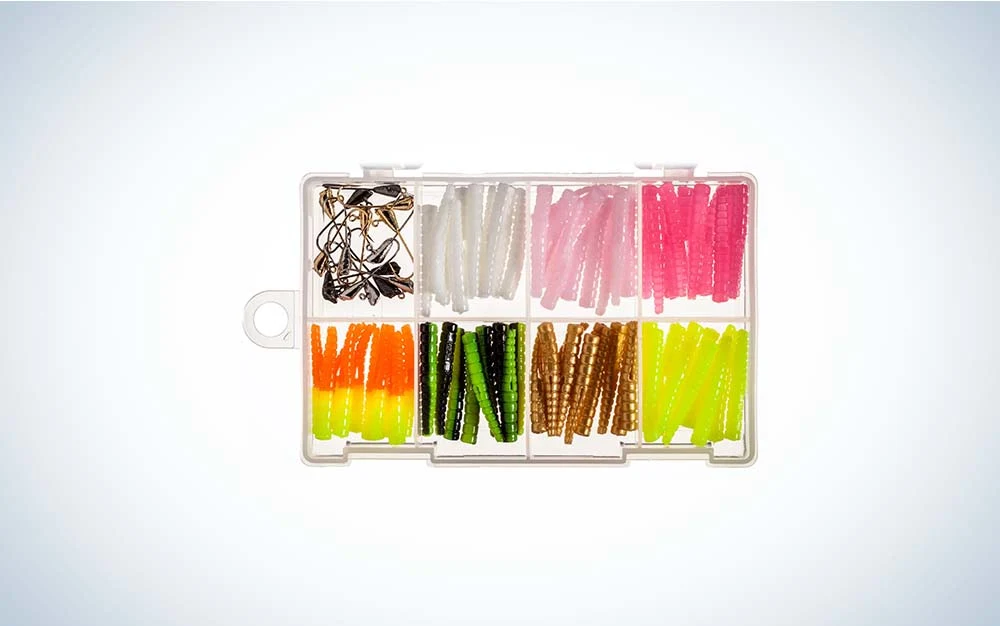
Trout Magnet
I’ve got a few tattoos, one of which is a trout lure: a big hook-jaw brown on my leg. It’s fair to say that trout are my favorite freshwater species, and I’ve been fishing for them since I was a wee tiny tyke standing on the shores of Rosedale Lake near my childhood home in New Jersey. Since then I’ve chased every kind of trout in every kind of water, from opening-day stockers in Pennsylvania, to wild Rocky Mountain cutthroats, to behemoth browns in the Ozarks
and beyond. I love them all, and over the years, I’ve come to rely on a variety of trout lures that get the line tight, time and time again.
I’ve also met trout addicts from all walks of life, all over the country, and I’ve absorbed the wisdom tied to their favorite lures, even if they didn’t become “go-to” trout baits
on my home waters. The following is a list of the best trout lures you can buy, baits that I—and a whole lot of other trout nuts—believe should always be in your arsenal and will have you covered for trout in deep lakes, to monster rivers, to the smallest mountain tributary.

The Best Trout Lures
1. Panther Martin Holograph Trout
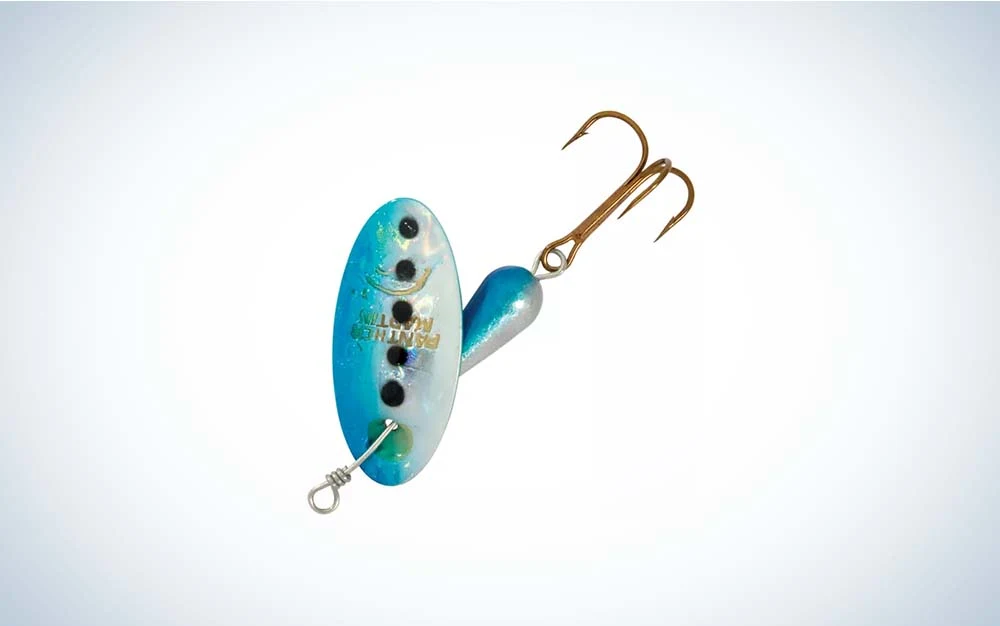
Pros
Colors that work in dirty water
Well weighted, fly far
When it comes to in-line trout spinners, many anglers are loyal to a particular brand (most of which made my list). Me? I’m a Panther Martin guy. The company might produce all sorts of new-age color patterns and finishes, but in my stream box, you’ll only find their classic teardrop body in sizes 1 and 2. In dirty water
, the black body with yellow dots and a gold blade gets tied on first; in clear water, give me the yellow body with red dots and a silver blade. The weight distribution of a Panther lets even the tiny ones fly far, and in my opinion, the distinct thump produced by the blade riding directly on the post—not on a clasp—catches more trout.
2. Worden’s Original Rooster Tail
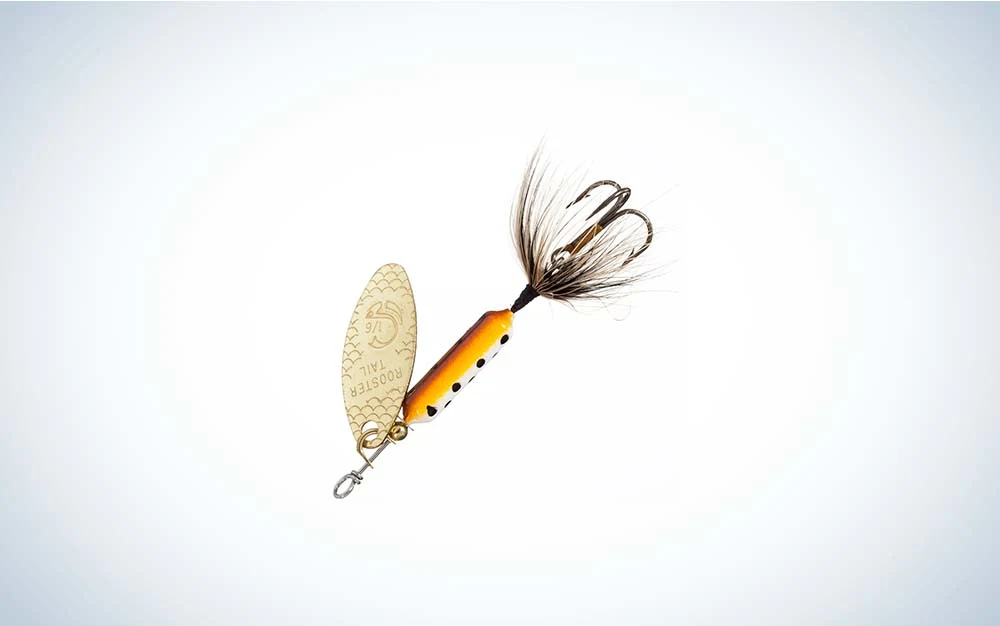
Pros
Time-tested
Wide rotation
Incredible color choice
Cons
Popular, go looking well before the season opener
A Rooster Tail’s willow-style blade has a wide rotation, creating the illusion of a larger profile baitfish when it’s spinning at full steam. There are literally hundreds of color patterns to choose from, but where I grew up in the Northeast, plain white with a silver blade was always a ringer trout bait. If you didn’t grab some weeks before the annual trout season opener, good luck finding them the night before.

Pros
Time-tested
Simple classic look
Comes in silver, brass, and copper
Cons
No color or tail, if that’s your thing
I’ll confess—I’ve never fished a C.P. Swing. However, I know these classics still have a cult following in many trout circles. They’ve been around for decades, and unlike some competitor offerings, you won’t find 200 color choices. Silver, brass, or copper are your only picks. Truth is, you probably don’t need any other colors to fool trout, and these simple trout spinners with a body of stacked metal beads and zero tail dressing have been fooling trout since your grandpappy was knee-high to a grasshopper.

Pros
Dressed and undressed options
Real squirrel tails move better on the water
Recycle your squirrel tails for money or store credit
Although originally designed in France, the Mepps Aglia has become an American icon, and the company is now based in Wisconsin. To a lot of trout nuts, the Aglia isn’t just one of the best trout lures ever made—it’s the best. Models with no tail dressing are extremely potent trout catchers, but many fishermen favor those featuring Mepp’s signature squirrel tail dressing. Fun fact: Mepps still actively buys tails
from hunters, and even has a video on its website explaining the best way to pack and ship them. You can opt to receive a check for your tails, or double the check amount in store credit so you can stock up on more spinners.
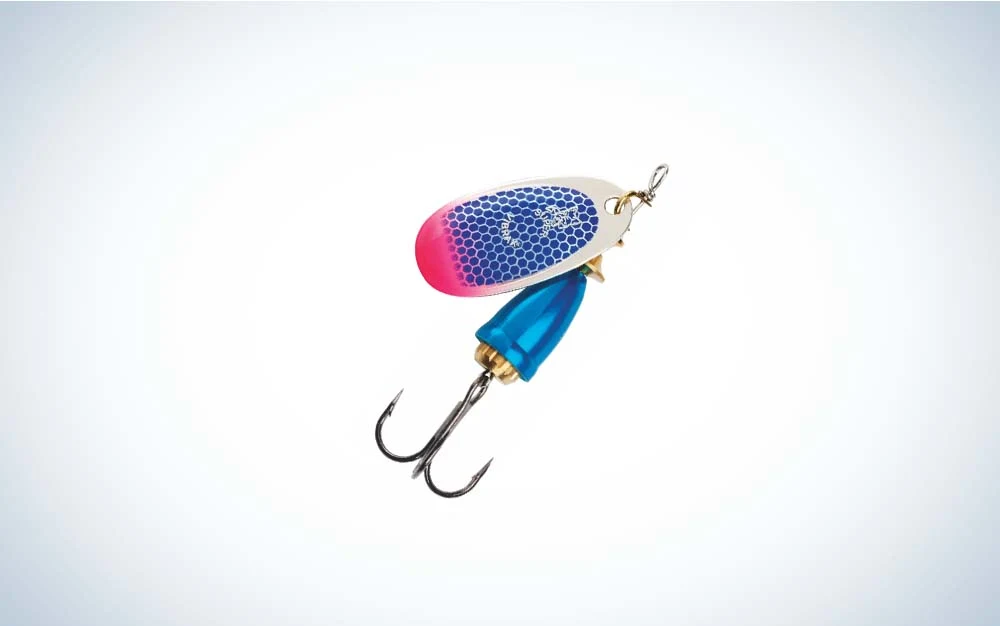
Pros
Fly farther than other spinners
Loud thumps on the water
Wide, cupped blades
Cons
Not great if you’re hitting smaller streams
The Vibrax has been a staple for West Coast trout and salmon anglers for many, many years. That’s not to say that they don’t live in the boxes of trout hunters elsewhere, but their loyalists are largely left coasters. Even in smaller sizes, Vibrax spinners are heavy, so you can whip them farther than a lot of other brands. One of the best lures for lake trout
, they also feature wide, cupped blades that thump louder than the rest—hence the name. They may not become your go-to trout bait on small streams, but in big rivers and lakes that hold heavy trout, a weighty Vibrax can be a serious meal ticket.
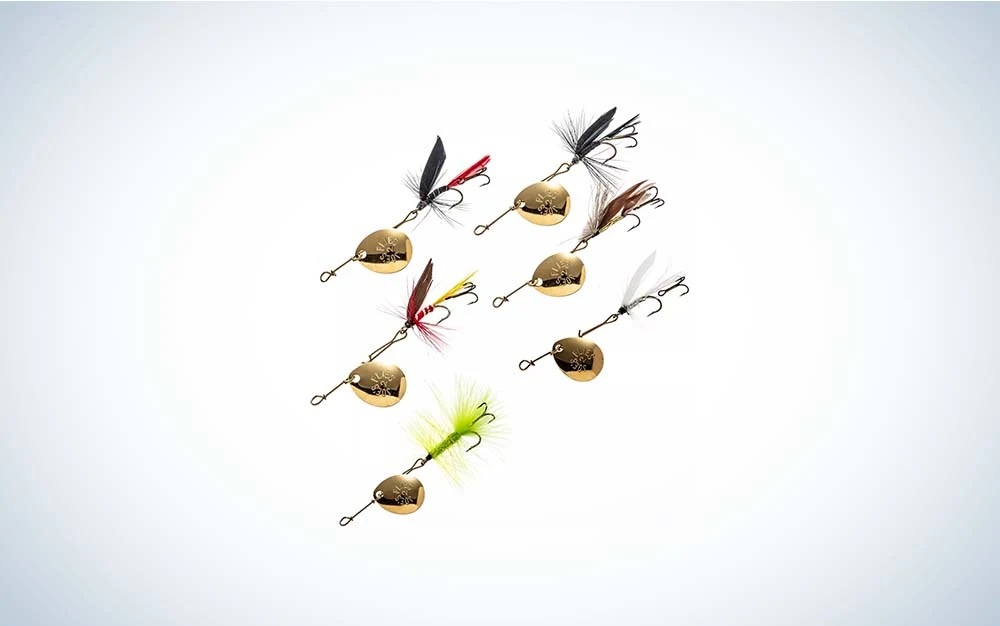
Pros
Exchange system lets you switch pattern combinations
Trailing treble hook
Cons
Very light, don’t fly far on a spinner reel
Fly purists cringe at these trout lures. That’s ironic because they were originally designed to be cast on a fly rod or a spinning rod. Joe’s Flies take classic wet-fly patterns like the Royal Coachman, March Brown, and Muddler Minnow to name a few, and rig them on a post with a big ol’ spinner blade at the other end. Love them or loathe them, this fly-spinner combo puts the hurt on trout. They might not cast a mile on spinning gear, but they land softly, have a strong thump, and are particularly effective when swept or swung across the current.
7. Trout Magnet

Pros
Plenty of natural or neon body colors
Great jighead
Great for stocked trout, but work with wilds too
Cons
Scentless
Trout Magnets are funny. When you buy a pack or kit of these micro mealworm imitators, you almost don’t believe they’ll work. It doesn’t look like they’d have much action, and they don’t have any scent. Yet when you rig one on the tiny, slanted, shad dart-like jighead that comes with them, it becomes a trout-catching machine. The secret is to not overwork a Magnet; just let the current deflect off that unique jighead, and it’ll dance. If you’ve got a skilled hand, you can fish one solo on light line, though they won’t cast very far. Fishing a Trout Magnet under a small float is more effective. There’s no doubt these lures are most associated with chasing stocked trout, but I promise wild browns and rainbows will gulp them, too, especially those donning natural colors.
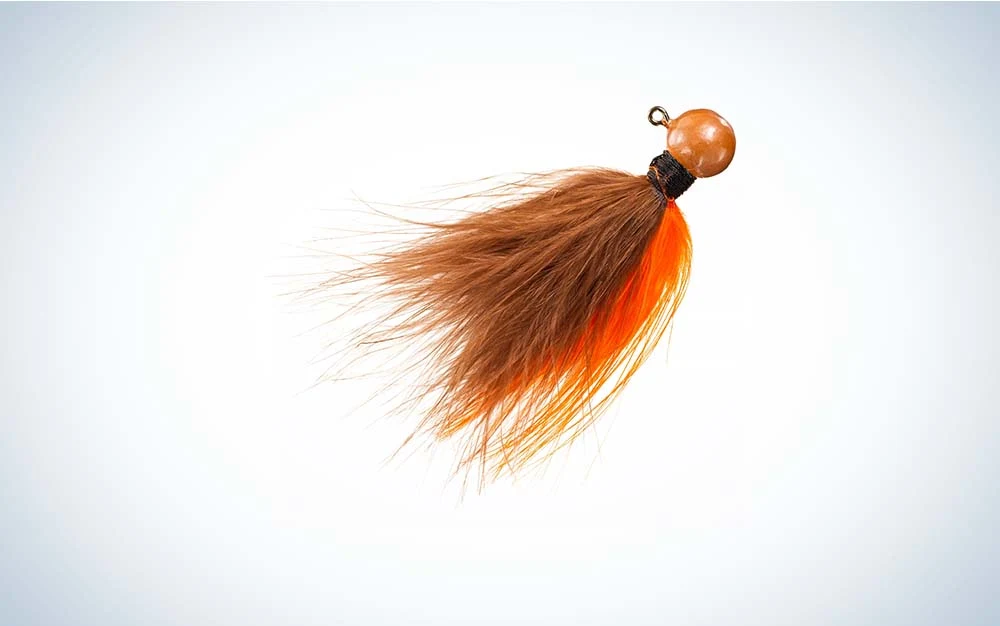
Pros
Breathing, pulsating action
Movement that always seems to attract fish
Cons
Working them takes some know-how
If you’re looking for a specific brand of marabou trout jig to pick up, try Zig Jig
. But the truth is that this entry is about a category of lures more than a specific brand or model. Marabou jigs are potent trout lures anywhere, yet their popularity is largely rooted in states like Arkansas and Missouri, where fishing them teeters on being an art form. There are also lots of small-time regional jig makers in those parts with devout followers. A seasoned jig fisherman on the White or Little Red River knows how to make the morsel work in place without moving it forward too quickly. The trick is jigging with almost a completely slack line while reeling very slowly. It sounds easier than it is, trust me. It takes practice, but once you get it, you’ll be shocked by how often a small marabou jig finds its way into the mouth of a really big trout.
9. Mister Twister Curly-Tail Grub
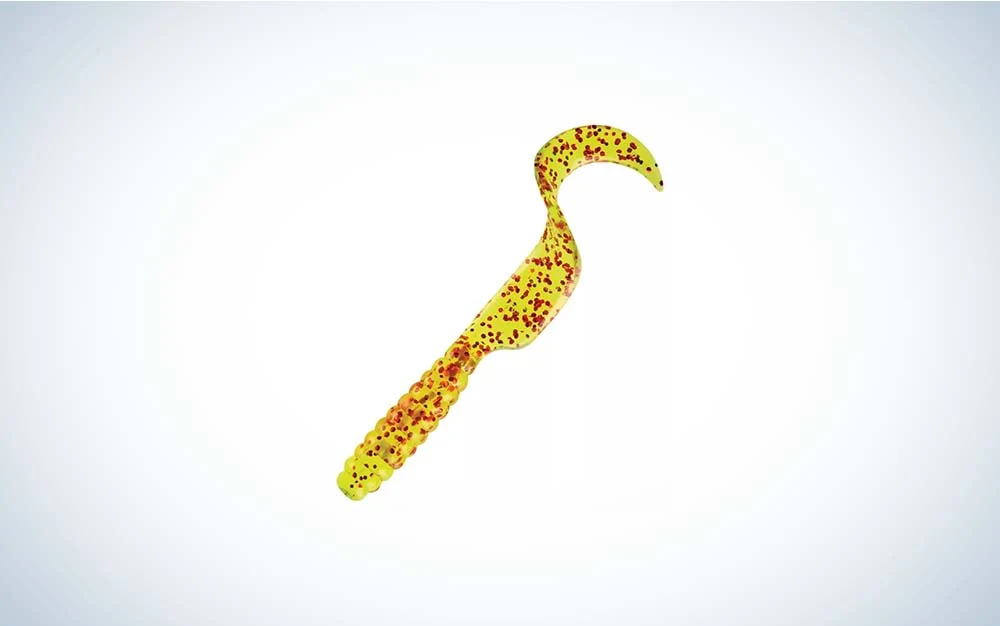
Pros
Versatile
Great for big trout
Classic soft plastic
Cons
Mostly for trout of a certain size
There’s a strong possibility you’ve been chucking Mister Twisters or something similar on jigheads at smallmouths for a long time. Have you ever taken them to a trout stream? If you haven’t, you should. A grub might not be a “numbers” lure on any given day, but when a trout gets pinned on one, it’s often a hefty player. If you think about it, big browns eat the same forage as smallmouths, and a grub’s versatility holds the same merit in trout water. In black, it’s a hellgrammite. In brown, it’s a crawfish. Swimming along in white, it’s a baitfish. One of the biggest trout I ever caught growing up in New Jersey smashed a root beer grub on the first cast in a deep hole I’d spent an hour bombing with spinners and jerkbaits without a touch.
10. Rapala Original Floating Minnow
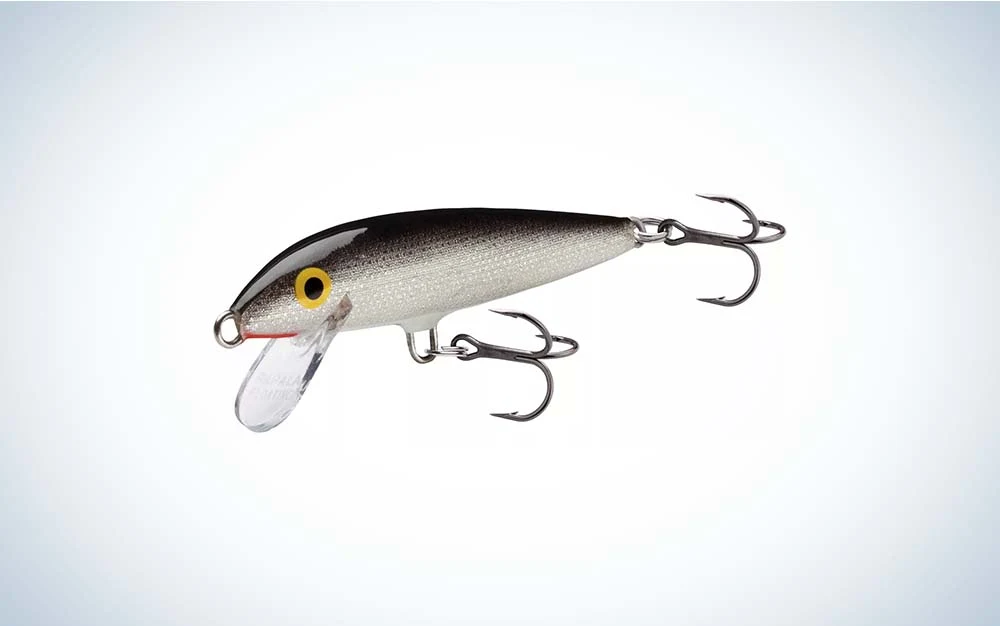
Pros
Time-tested wounded minnow action
Plenty of size options
Simple but effective
In truth, this lure ends up on just about every “best-of” lure list that’s ever written about any freshwater species. As it should, because it catches them all, including trout of all sizes. Different styles of jerkbaits and more modern offerings have a place in the trout game (read on), but you can’t take away from the potency of a simple black-over-silver floater. In small sizes, it pounds “pan-sized” trout. Beef up to a number seven or eight, and the heaviest brown in the run just might move to take a shot. These lures aren’t overly flashy and they don’t even rattle, but the buoyancy and roll of their balsa wood bodies give them a wobble and hover ability that’s been crushing fish for well over 50 years.
11. Smithwick Suspending Rattlin’ Rogue
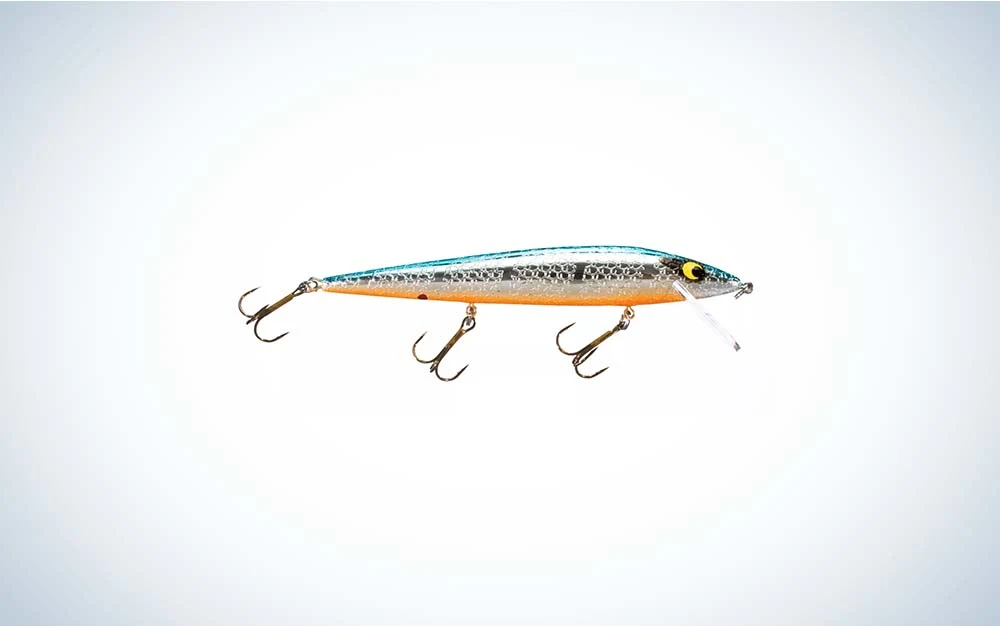
Pros
Loud rattle
Variety of paint schemes
Wounded minnow action
Cons
Big fish only
Similarly to marabou jigs, Rogues are staples in the arsenals of trout anglers in the Ozarks region. Unlike the jigs that will catch trout of all sizes, however, the Rogues tend to come out only when hunting “the one.” The available colors are vast, and Smithwick offers a plethora of styles that dive to different depths, sink, float, and suspend. Working a Rogue all day the right way—hard and fast—will give the arms, wrists, and shoulders a workout, but the unique darting action and sound of these hard baits often turns pain into glory.
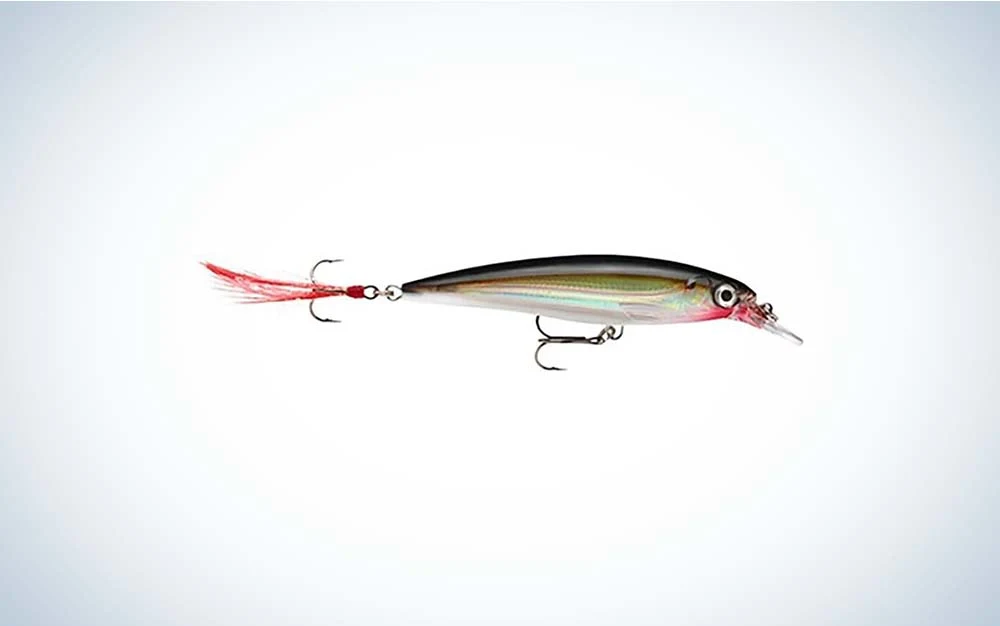
Pros
Great movement with aggressive swimming and darting
Variety of sizes and colors
New-school holographic cores and 3D eyes
The X-Rap Slashbait is considered by many to be the modern equivalent of Rapala’s Original Floater. The massive color palette features new-school tweaks like holographic cores and 3D eyes, but it’s the lure’s action that really makes these baits shine. No doubt, the Slashbait is my go-to hard bait for trout in larger streams and rivers, as its ability to dive fast, change direction, jackknife, and hover on the pause has caught me more browns and rainbows than I could ever count. I’m partial to the 3 1/8-inch model, as it seems to appeal to fish of all sizes, but you can scale up or down in length and still count on the same aggressive swimming and darting action to score from the river to the lake.
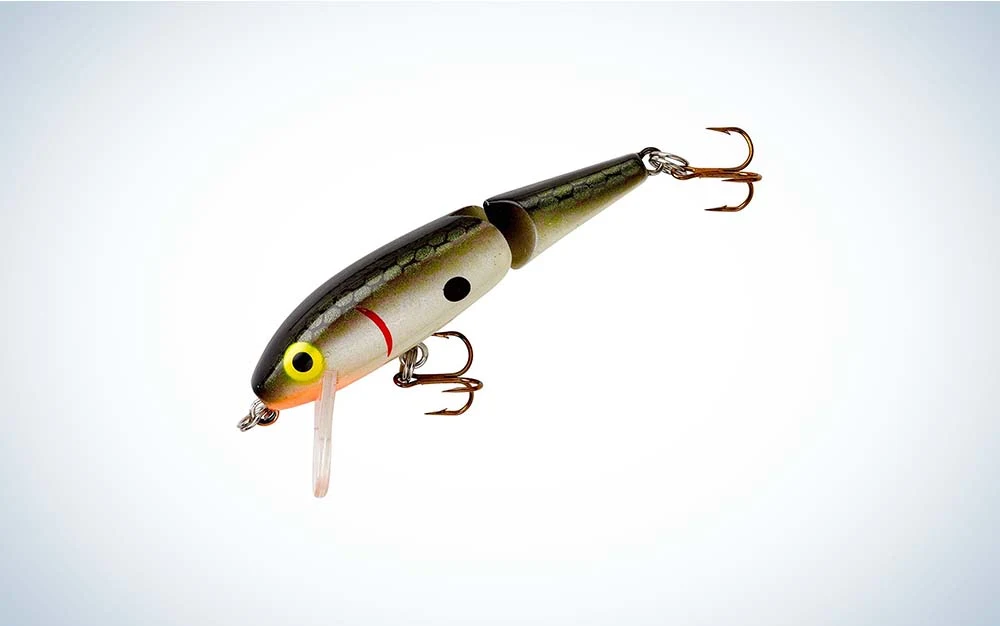
Pros
Easy to get the tail section moving
Slow-retrieving makes it straightforward to use
Extra action convinces fish smart to an unbroken minnow
Cons
An unbroken minnow can work just as well
Often referred to as a “broke-back” Rebel, this little minnow plug packs a serious wallop on trout. Don’t worry, Rebel loyalists, I realize the unbroken Rebel Minnow
is a killer, too, but there’s just something about the jointed version that makes it a deadly trout bait in small streams. Unlike other hard baits that need to be worked aggressively to catch trout, a jointed Rebel Minnow shines on a straight retrieve, and it doesn’t take much to get that tail section kicking. In clear water especially, I’ve watched a slow-crawled jointed Rebel running just under the surface, waking ever so slightly, get positively pulverized countless times. I tend to tie these on whenever a finesse presentation is necessary and I want the lure to remain in play on the pause, which doesn’t really work with an in-line spinner.
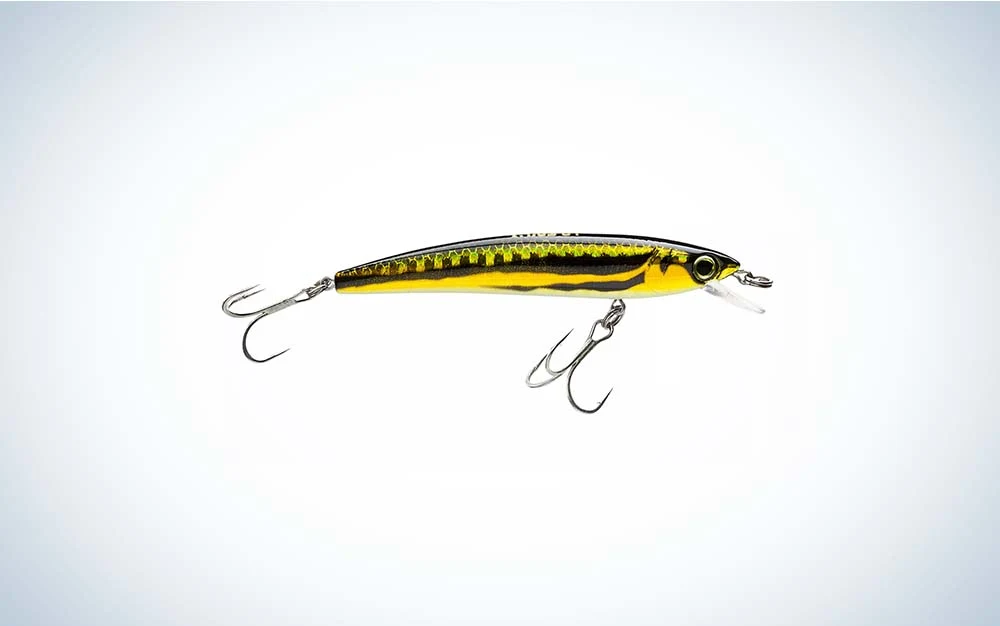
Pros
Internal weight transfer: flies accurately
Great on a steady or erratic retrieve
Small weight is perfect for small target area
Cons
Small size makes it a bit specialized
A 2 inch long Pins Minnow might be my all-time favorite pocket water hard trout bait. It’s tiny, for sure, but the internal weight-transfer system helps this little guy fly straight and accurately—a major benefit when trying to hit small target zones. It’s just as effective on a steady retrieve as it is when aggressively whipping the rod tip. The finishes on these lures are extremely flashy, and they land with the slightest splash. It’s hard to go wrong with silver-and-black, though I’ve whacked some chunky trout on the rainbow pattern.
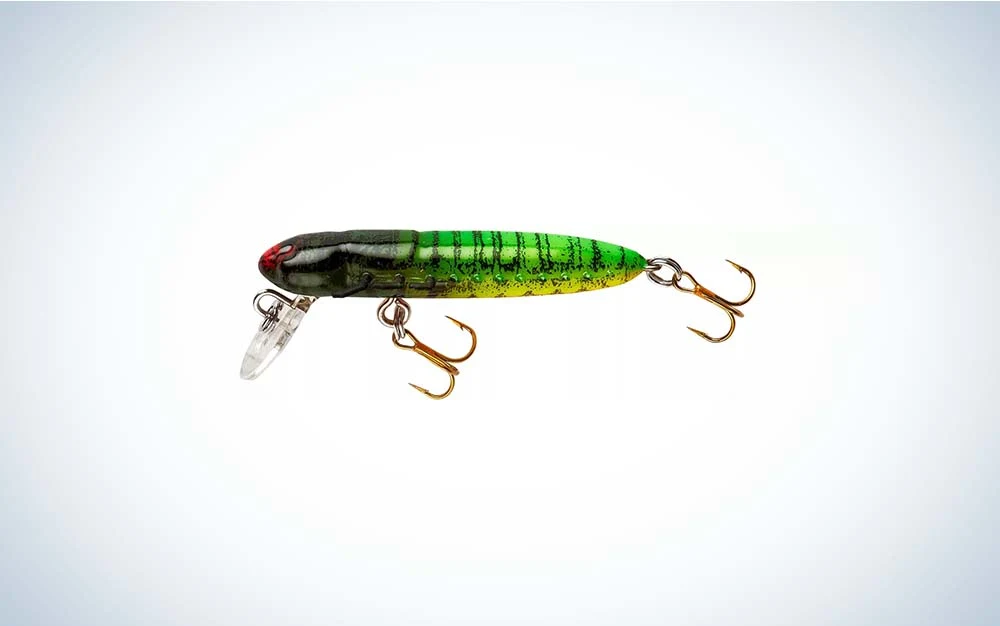
Pros
Lands gently
Dives well
Cons
Another specialized option
In my opinion, the Rebel Hellgrammite is one of those lures that if you know about it, you know about it. It’s been around for a long time, yet it’s not exactly a staple in many boxes, let alone the first hard bait anglers who do carry them will tie on. But sometimes—often during low-water periods—this little wobbling bug kicks butt when nothing else will. On those days when the water is clear, and I know I need to keep my distance from a pocket-water hole, I can send a Hellgrammite far on 4-pound-test. It makes very little commotion when it lands, and a couple of cranks will make it dig fast. Get this lure ticking along the bottom and sometimes even the most lock-jawed browns are suddenly starving.
16. Acme Phoebe
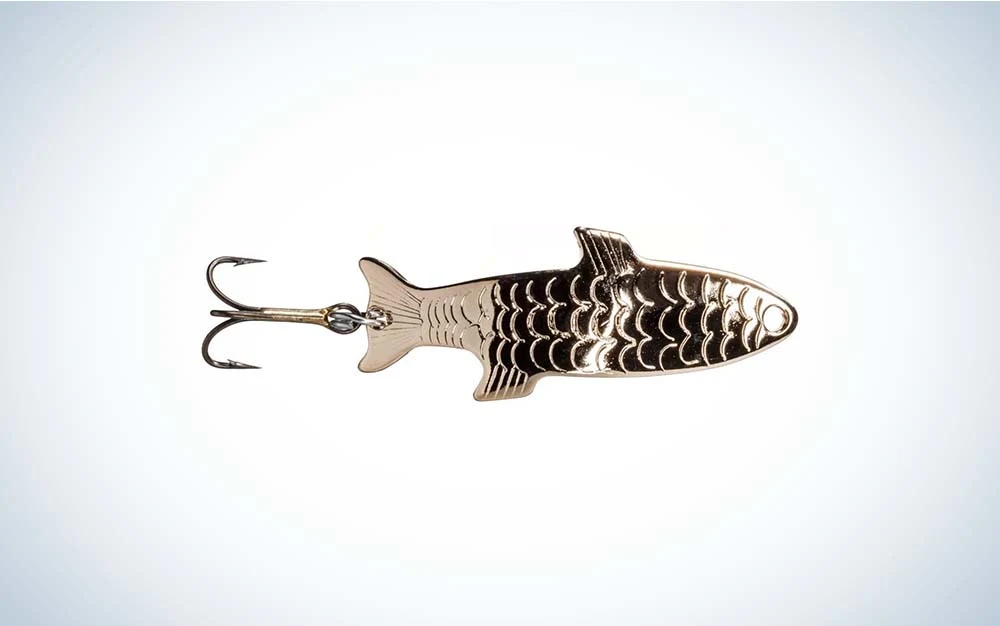
Pros
Flashy
Different wobble to convince fish
Cons
Good for a specific use
The Phoebe is so cute, isn’t it? This shiny little fish with anatomically correct fins and tail almost looks like a gimmick lure. It’s not. The Phoebe has been around for decades, and there’s a strong chance that when you swing one across a fast-water run, a big trout will think it’s so cute it just has to kill it. I don’t use Phoebes often, but I love this trout bait in gold when the water is high and off-color. These little spoon hybrids give off heaps of flash, and something about their unique twisting wobble is irresistible to stocked and wild trout alike.
17. Acme Kastmaster
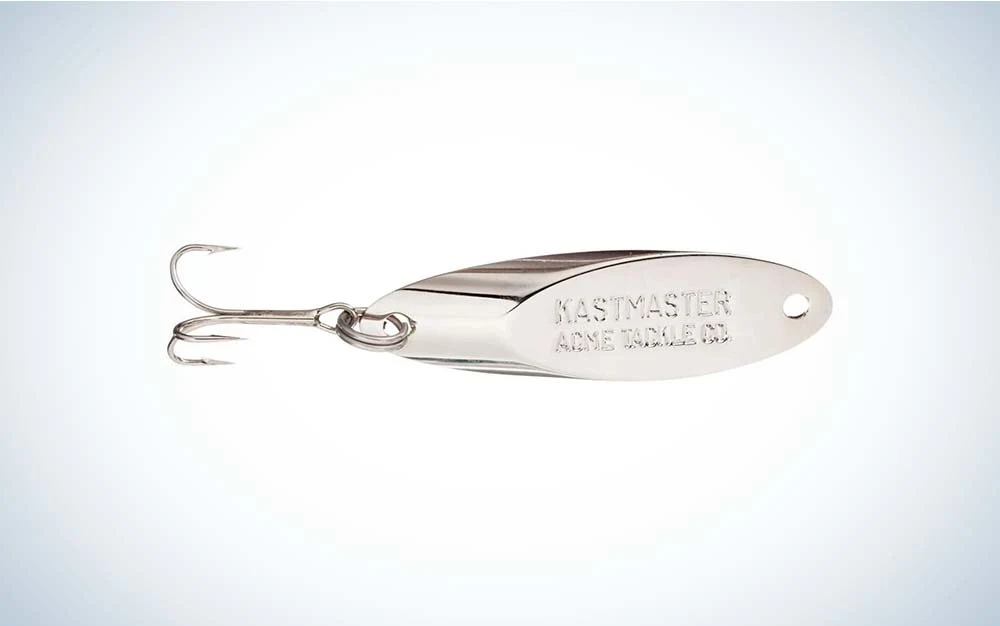
Pros
Heavier weights, long casting and quick sinking
Great for lakes and ponds
Sleek and dense
Cons
Probably not what you want in a stream
You’re more likely to find a Kastmaster in the tackle bag of a guy chasing bluefish and striped bass in the salt than the one being toted by the average trout guy. One of the all-time best trout lures, it’s great in still water to cover distance and hit a drop-off other lures might be too light to reach. Available in a wide range of sizes, Kastmasters fly for miles and sink like stones. That sink rate isn’t usually what you need on a stream, but those who target still-water trout can benefit from that fast drop. In smaller sizes, Kastmasters let you cover lots of water on foot, and because of their weight, they can help you hit drop-offs and ledges in lakes and ponds that lighter lures can’t reach. From a boat, these sleek hunks of metal can be some of your best trout lures when jigged vertically.
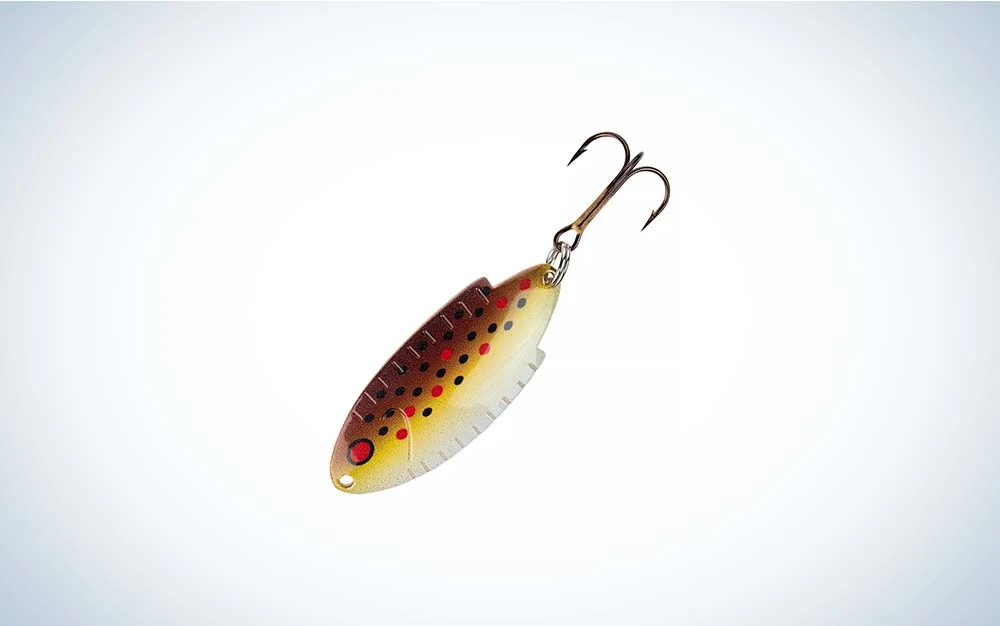
Pros
Perfect on a slow retrieve
Can work for something more aggressive
Tapered cutaway to mimic fish fins
Cons
Sinking isn’t ideal in smaller streams
Though somewhat of a sleeper in the overall scheme of the trout game, the Buoyant Spoon has its share of fans. I happen to be one of them. The unique design—which features a cut-away taper that mimics fish fins—gives these trout lures a very erratic wobble. You can also get them to dart from one side to the other using a more aggressive retrieve. I may not tie one on often, but in lakes and larger rivers that are off-color, I’ve had a lot of success firing a Buoyant to a deep hole or drop-off, letting it flutter down, and popping the rod tip hard to get it to jump back up into the column. Keep a tight line, because it’s often during the fall that these metals get smoked.
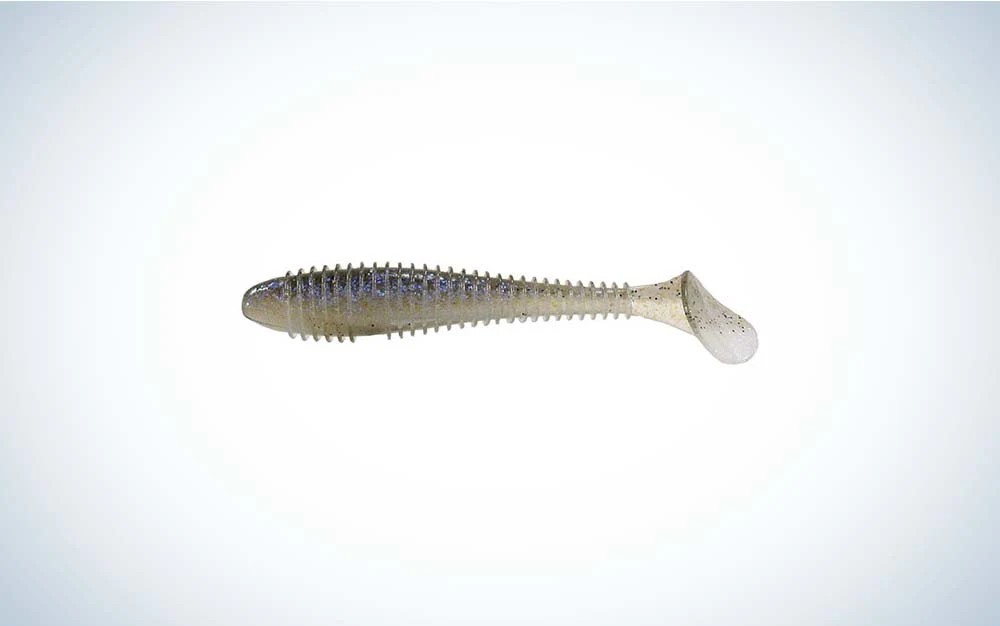
Pros
Good pitching and rolling on a steady retrieve
Something special about it that trout love
Fat body with solid tail
Cons
Overlooked as just a bass bait
This ribbed swimbait has been making massive waves in the bass world for a few years now. It was designed in Japan, and while it’s widely known that smallmouths and largemouths clobber these soft-plastics, trust me, monster trout smash them too. Paired with a jighead and retrieved steadily, the FAT Swing Impact pitches and rolls while its tail thumps away. I know what you’re thinking; lots of lures do that, but there’s something about this one that seems to make it get plowed faster than similar baits. The 3.3-inch model has become one of my go-to trout baits for a few seasons now, and more than a couple good browns have swung on my Swing Impact.
20. Berkley PowerBait Floating Trout Worm

Pros
Great shape and size
Versatile depending on how you rig it
Stocked trout and PowerBait go hand in hand, but many of the offerings in the PowerBait line-up are just that—bait. This worm qualifies as a lure, and a potent one to boot. Because of its ability to float, there are several presentation options that score. Rig one on a drop-shot and bounce it through a hole. Another popular delivery method is pinning the worm in through the middle with a small jighead. This essentially qualifies as whacky rigging, which allows the worm to flutter on the drop when jigged, but also keeps it in play when it’s just lying on the bottom.
Why Trust Us
For more than 125 years, Field & Stream has been providing readers with honest and authentic coverage of outdoor gear. Our writers and editors eat, sleep, and breathe the outdoors, and that passion comes through in our product reviews. You can count on F&S to keep you up to date on the best new gear. And when we write about a product—whether it’s a bass lure or a backpack—we cover the good and the bad, so you know exactly what to expect before you decide to make a purchase.
![Field & Stream [dev]](https://images.ctfassets.net/fbkgl98xrr9f/1GnddAVcyeew2hQvUmrFpw/e4ca91baa53a1ecd66f76b1ef472932b/mob-logo.svg)





